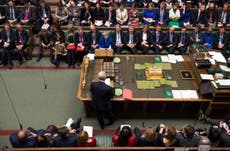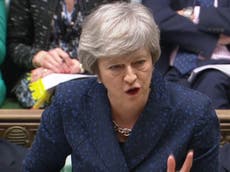The public don’t understand no-deal Brexit – so it’s time we properly discussed it in parliament
A few hardline Brexiteers such as Boris Johnson would be able to explain why quitting without a deal is a good idea. The vast majority of MPs would be able to explain why the whole thing is so ridiculous

Many Leave voters think crashing out of the EU would be just fine. MPs, who have never discussed no deal properly, now need to say why that’s not so.
A series of amendments on Tuesday – notably those from Yvette Cooper, Rachel Reeves, Caroline Spelman and Dominic Grieve – are attempts to stop us crashing out. They are all important. But we also need a grown-up debate where all the arguments both for and against no deal can be aired.
Last week we had a vote on the government’s deal. This followed five days of debate. Let’s now have five days of debate on no deal, also followed by a vote.
This might be an extravagant use of parliamentary time were it not for the fact that the prime minister is refusing to rule it out – and partly because the hardline Brexiters are seducing the public to think that leaving the EU to trade on “World Trade Organisation” terms would be a walk in the park. If talk about the government preparing to impose martial law in the event of leaving without a deal is anything to go by, then this is clearly not the case.
Now this is not the place to rehearse all the reasons why this isn’t so. (Although one only has to look at Airbus’s warning that it could pull out of the country and Sony’s decision to move its European headquarters to Amsterdam to see we risk corporate arson on a massive scale.) It’s rather to point out that MPs haven’t yet debated the pros and cons in the round despite the fact that we will crash out in just over two months unless something happens.
Sure, there have been debates on specific aspects of no deal – such as Wales, agriculture, the environment, the cost, border delays and other countries' preparations as well as the acceleration of our own contingency plans. But that’s not the same as MPs examining the issue holistically.
If there was a long debate, everybody could give their view. A few hardline Brexiteers such as Boris Johnson should explain why quitting without a deal is a good idea. The vast majority of MPs should say why it is ridiculous.
There should then be a vote. This would only be “indicative”, in the sense that it would not compel the government to do anything. But the “will” of parliament would carry great moral force.
Spelman has already proposed a vote on no deal on Tuesday as an amendment to the government’s motion. She is backed so far by 128 other MPs. This could be followed by a debate, with a second vote at the end of it to ram home the message.
Such a debate would be complementary to Cooper’s proposed legislation, which would require the prime minister to ask the other EU countries to delay Brexit if MPs can’t agree a deal; and Grieve’s amendment that would take control of the parliamentary agenda for several days.
A vote on no deal would also be different from the amendment to the finance bill that Cooper orchestrated earlier this month. Although that too sent a powerful message that MPs didn’t want to crash out of the EU, it was not a “clean” vote. Some parliamentarians, including Spelman, didn’t vote for that because they were worried about the precedent of interfering with the government’s budget.
There is already a dispute in government over how to handle Cooper’s emergency legislation – with some ministers, such as Amber Rudd, calling for a free vote at this week’s Cabinet and others opposed to that measure. Rudd has been holding meetings with 17 other ministers determined to stop crashing out in what has been dubbed the “hairshirt club”.
Although nothing has been decided, the smoke signals from Downing Street are that the prime minister will whip against Cooper’s plan. Perhaps she will argue that letting backbenchers take control of the parliamentary timetable is a constitutional innovation that Tories should be wary of.
It would be much harder to whip against a clean no deal vote, as it does not carry the same constitutional implications. But, if Theresa May did, she might provoke a raft of ministerial resignations.
A proposal along these lines should unite a broad coalition: almost the entire opposition as well as Tories who back a "people's vote", those who want a soft Brexit and others who supported May’s deal.
Earlier this month, 202 MPs backed the prime minister’s deal. Hopefully, there would be far fewer who want no deal.
A proper debate would also engage the public who are turned off by the parliamentary manoeuvring dominating the headlines. For a whole week, the hardliners would have to defend their proposals and the rest would attack them. And the prime minister would have to say where she stands. She couldn’t just stay in her usual “listening mode”.
We are in a national crisis. If parliament is not for examining whether it makes sense to charge over a cliff, what is it for?
Hugo Dixon is deputy chair of the People’s Vote






Join our commenting forum
Join thought-provoking conversations, follow other Independent readers and see their replies